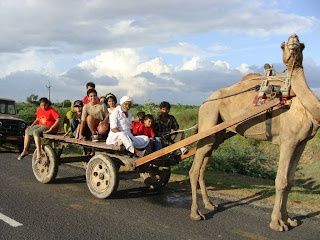It's been a week today since Ba passed away, and the condolence e-mails from friends and family far away continues.
I remember feeling relieved when Papa called to tell me that she has succumbed early that morning. The last time I saw her, four days prior, she had not recognised me. Her breath was jagged, with the rough, scraping sound of a body that was giving up, her words indecipherable. After a while, she thought I was my sister. Her favourite grandchild, the one who looked like her and was as good a cook. She smiled repeatedly at Nino, questioning eyes looking at me, recognising him perhaps, but not able to place the context of that memory. Do you live closeby, she asked me, playing host, her way of thanking me for coming to see her. I told her where I lived, and she nodded politely, and then suddenly she asked if my mother-in-law was back: and for a second I knew that perhaps she knew, but that moment passed away and I left, her light-grey eyes imprinted in my memory. I shed tears for her pain, for her skin that was peeling away, for the ghost of the woman that she'd become.
That day, as we sat around her body, crying in turns for her, for us, for the others before her who have left us, I saw faces and names I've never met. People who trooped in from the far away ancestral village, travelling in jeeps and buses to come meet her, one last time. I heard tales of how she'd protected women from errant or violent or drunkard husbands, how she'd helped girls get married by shouldering responsibilities, by cooking for hundreds of people, by singing all night long. How she raised her children, on her own.
She died on a very auspicious day, I was told repeatedly. Radha Asthami, the birthday of Radha, the Lord's consort. There would be prayers and donations everywhere, it couldn't have been a better day for a Brahmin's soul to depart. Her last month, by when she was just having a few sips of water and perhaps half a cup of milk, was coincidentally Shravan, the holiest Hindu month, wherein fasting is considered the quickest elevator to good karma. In a way she too fasted, they told me, it couldn't be better. Her soul passed away from her mouth, I was told, the second most auspicious kind of death. As they placed
gangajal, and tulsi leaves and little bit of gold wrapped in tulsi leaves in her mouth, I
learnt that Hindus believe the soul 'escapes' from several 'openings' - inlcuding the eyes, nose, mouth, genitals - perhaps signifying the chakras. The 'port of escape' according to some scriptures offers a clue about the next birth and likely karma of the deceased. Her eyes were open when she died, and so was her mouth - and because her breath was the last thing that my uncle heard, they said her soul had passed out of her mouth - very lucky, they said.
It was a macabre word to use that day - luck - and yet as I sat through my irritation at the statements, I realised the simplicity of the message - the need to see the good even in something as destructive as death. These were simple folk, those who knew no fancy words that could make it into condolence-cards: this was their way of giving us support, of letting us know they wanted us to get through this. And I was humbled by the love she received, by the love we received, by the love that I received. They knew me by name, had heard of me from her, and they called me by a name my childhood has long buried - and the memories came flooding back - of her, and her warm
lapsi, the walking in a blue banarsi sari to see her on New Year's Day, hands firmly clasped on my ears to shut out the Diwali crackers, stopping in the narrow lane because of cow-dung cakes - I would have to set one hand free to lift my saree to jump over, but I was too frightened of the crackers. I was less than 10: and she had laughed uproariously at first and then seeing my tears, shooed the
pol boys away.
For the past few years, I'd viewed her through my father's eyes and my mother's eyes, perhaps because the roles of daughter-in-law and mother came to the fore: and I used my own yardsticks of being a happy daughter-in-law and a new mother to compare, to make judgements. And yet I saw her daughters-in-law as devastated as her sons when she died, they cried over memories that were far more forgiving that those that I remembered. I remembered a
dear friend that day, one who recently taught me that people do the best jobs they know how to - in all their roles.
In this past week I've discovered a woman who was not unlike me - a woman who spoke her mind, who had strong likes and dislikes, who fought to keep her family together. I discovered a woman who made the best of what life gave her - her moments of grace far outnumbering the others. Whose expressions of affection were just different from what I expected.
Forgive me, Ba, for days when I was quick to judge, quicker to criticise. For my fights - verbal and silent - and for my tears of anger that I knew you sensed. For the love that I feel now, too late. I hope you're happy and at peace, and I hope to meet you again.











